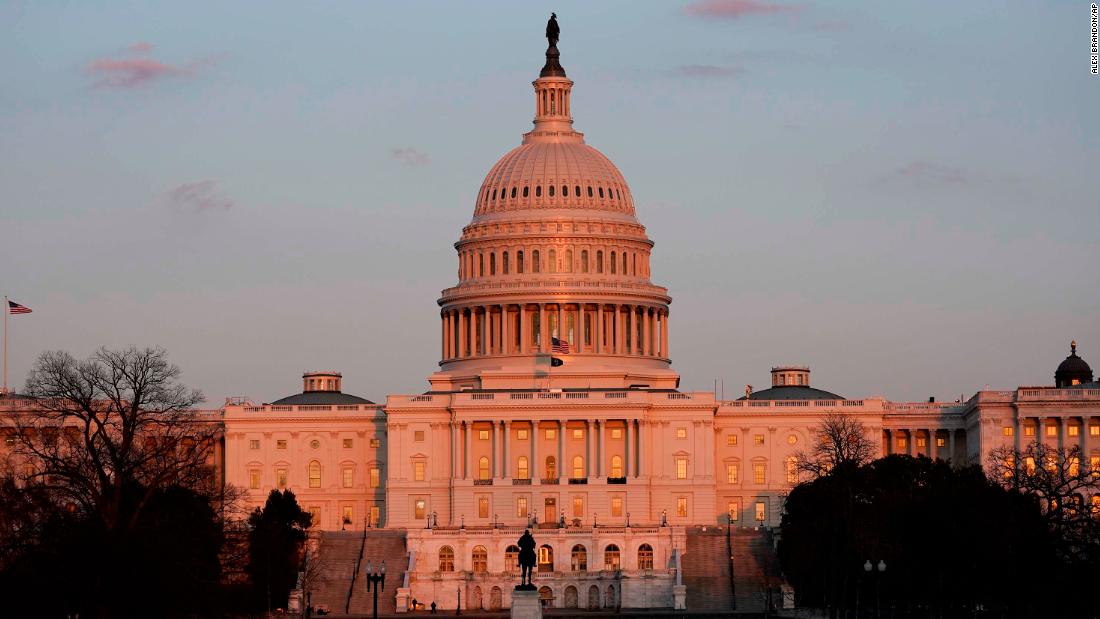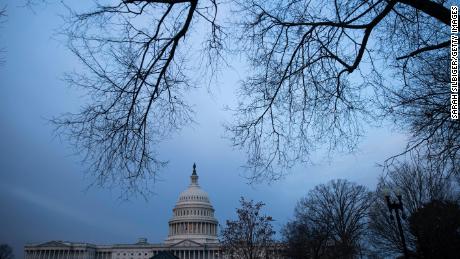A theatrical Senate floor tussle is writing the early history of the Biden era
But Republicans charge the measure is laden with big-ticket liberal spending that has nothing to do with the crisis and quarrel with substantial aid payments to states and cities that they argue are hurting less than expected owing to better-than-projected tax revenues.
The bill’s vital symbolic importance to a new President sizing up a capstone for his first 100 days, likely lock-step GOP opposition and a struggle by Democratic leaders to corral a troublesome caucus behind it, foreshadow two tumultuous years in Congress.
“If we act now — decisively, quickly, and boldly — we can finally get ahead of this virus. We can finally get our economy moving again,” Biden said last week.
The clash over Covid relief also reflects the changing politics of the pandemic, with Biden warning the crisis is far from over and Republicans arguing that a sudden surge in vaccine distribution and a fall in new cases makes more huge government aid superfluous.
Senate debate on the American Recovery Plan will start for real on Friday after Johnson, who is leading a circus-like GOP bid to slow down the bill, forced Senate clerks to read the bill aloud — a process that began Thursday afternoon and was expected to be a 10-hour marathon.
For a while, Johnson was the only senator in the chamber on Thursday evening as luckless Senate clerks plowed through the monster text — reflecting the grandstanding inherent in a gambit that seemed scripted for conservative cable news shows.
By trying to highlight what he sees as massive overspending with a stalling effort, Johnson — who was most recently seen selling delusional claims that the red-hatted invaders of the US Capitol on January 6 were not Trump supporters — is focusing attention on a GOP conference apparently committed to politics of obstruction.
Senate Majority Leader Chuck Schumer blasted Johnson’s tactics on Thursday, saying it wouldn’t do much more than give the clerks “sore throats.” But Democrats may also be relaxed that a high-profile supporter of Trump prone to wild conspiracy theories has emerged as the most visible Republican opposition to their efforts, since it allows them to drive home the case that the GOP is in denial and heartless. That was a message that helped Biden position himself as the man to end a national crisis in his campaign last year.
“Americans should see the bill,” California Democratic Rep. Eric Swalwell said on CNN “Newsroom” on Thursday. “That’s why it’s posted online.”
“Every hour that stunts like this are pulled off is an hour that a hungry person is not fed and an unemployed person is not at work and someone in need of a vaccination, like a teacher, doesn’t get it,” he said.
Republicans risk opposing a popular rescue
Democrats, in their aggressive effort to drive the measure into law, are meanwhile showing they have learned the lessons of the past. While Biden made a show of being open to GOP ideas on the measure, he and the Democrats are certainly not hanging around waiting for a change of heart across the aisle.
The President argues that the pain of the pandemic, with Americans desperate for vaccinations and millions out of work, justifies the rush. But memories are still fresh on Capitol Hill of futile attempts to get Republicans to cooperate on health care reform in the Obama presidency and the failed bid for their buy-in on the Great Recession rescue bills.
Democratic moderates also secured new funding for broadband, rural hospitals and Amtrak. But Senate Majority Whip Dick Durbin of Illinois warned on CNN that the final majority for Biden’s top priority was still not assured.
“There are active discussions under way,” Durbin told Wolf Blitzer on “The Situation Room.” “We shouldn’t assume the ultimate outcome until it happens.”
In another revealing sign of the shiftable power dynamics in Washington, Democrats were also courting a single Republican vote — Lisa Murkowski of Alaska.
“We already know there are some things in it that are clearly not Covid related, but I’m looking at some of the things that will provide a level of relief for a state like Alaska,” she said. “So, trying to make a bad bill work better.”
Republicans can’t quite be certain that they have the independent-minded Murkowski, who voted to convict Trump in his second impeachment trial, on their side when it comes to the final vote — a scenario likely to play out often over the next two years. Sen. John Thune of North Dakota, the No. 2 Senate Republican, said he was “hopeful” that his colleague would stay loyal for a show of force that would allow the GOP to portray the first big win for Biden, who campaigned on a platform of bringing Americans together, as purely partisan.
The President hedged against such arguments on Thursday by hosting a bipartisan meeting with House members on infrastructure reform at the White House. Infrastructure will be the acid test of Biden’s belief that there really is some way to get rivals across the aisle working together. It’s an issue that in theory every member — keen to funnel cash back to their districts — should be able to agree on. But year-after-year, infrastructure reform perishes on the altar of partisan politics as elections loom and political capital dries up.
McConnell claims credit for easing pandemic
While Johnson’s bill reading tour de farce exemplifies the performative aspect of politics in a party still dominated by Trump, comments by Senate Minority Leader Mitch McConnell pointed to its longer-term strategy.
The Kentucky Republican brazenly claimed Biden, elected to replace Trump’s neglect and denial of the pandemic, was merely taking lucky advantage of steps taken by a Republican White House and Senate to tackle the virus and save the economy. And he argued that a fall in holiday season infections — albeit to hugely elevated levels — and increasing vaccine supplies meant that large-scale injections of government cash were no longer necessary.
“Instead of heading into a dark tunnel, we’re accelerating out of it. Incredible vaccines. A rebounding economy,” McConnell said on Thursday.
“But Washington Democrats are trying to exploit the last chapters of the crisis to pass what President Biden’s Chief of Staff calls ‘the most progressive domestic legislation in a generation.'”
Friday’s Senate action on the relief bill will also underscore another important consideration in Washington’s delicate political equilibrium.
Any large-scale changes that Schumer is forced to make to appease moderate Democratic senators like West Virginia’s Joe Manchin and Arizona’s Kyrsten Sinema will cause a headache for Speaker Nancy Pelosi as she tries to convince progressives to stay in line on a unified House and Senate measure, which both chambers will need to pass before it reaches Biden’s desk.
Given how critical Americans’ needs are and how important the legislation is to the success of Biden’s first 100 days in office, the speaker will probably be able to keep the Democratic caucus in line. But there is also little room for error in the House since Democrats saw their majority narrowed in November’s election.
And boiling tensions among liberal lawmakers over Biden’s caution and the constraints of a fungible Democratic Senate majority will only grow more intense in an already fraught but fascinating run-up to next year’s midterms.
![]()






